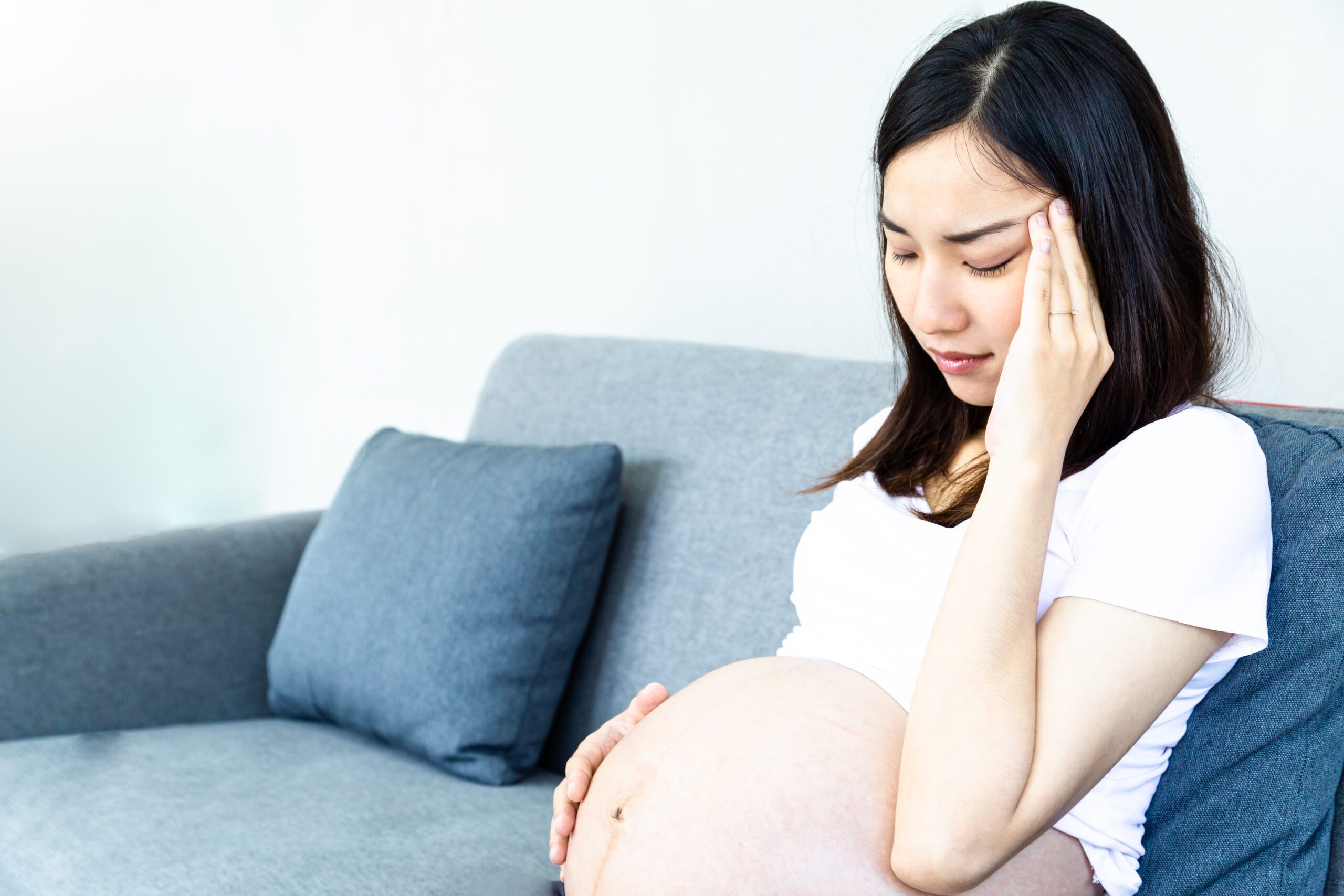
07 Oct What does anxiety look like in prenatal mental health?
Isn’t pregnancy an exciting time? I remember, when I first found out about my pregnancy, there was a wave of emotions that I experienced. As I held the results of my pregnancy test, I remember thinking to myself ‘You will soon become a parent to an adorable, tiny human.’
The thought was exhilarating. I didn’t imagine that I would experience a rollercoaster of emotions during pregnancy, or that all my emotions may catch me off guard. Some women feel joy at every flutter or kick, marveling at their changing bodies.
But, that’s not true for everyone. For me, despite my joy and excitement, pregnancy was hard. I experienced severe morning sickness that unfortunately lasted for the entire day. I was having fatigue and my ankles and feet were always swollen. Along with these physical changes I was also having mood swings, with a different emotion running through me all the time.
I also remember feeling an overwhelming level of worry during my pregnancy. I began to realize that with every passing day, my thoughts were spiraling out of control. This began affecting my performance at work and my relationship with my partner and my in-laws at home. I had always been an anxious person, but during my pregnancy my anxiety was at an all time high.
What causes anxiety during pregnancy?
I started to work towards managing my anxiety by trying to find the answer to this question. I realized that worries during pregnancy are universal. Every individual experiencing pregnancy goes through some level of worry. Hormonal changes of pregnancy, changes in social expectations, and sleep difficulties may all contribute to anxiety for new moms.
Along with that, new moms may worry about how their baby will affect their existing relationships – be it with their partner or with friends or family members. They may also worry about the health of their future child, the delivery experience, or even the financial burden of an additional family member. All of these worries and anxieties are completely normal. For humans, a certain amount of anxiety is protective.
And while my anxiety also stemmed from the same thought, I found myself unable to stop thinking about these things and my emotions were heightened too during this time. I did discover, after a lot of introspection and conversation with my partner, that my anxiety came at the amount of uncertainty I was experiencing and would continue to experience.
Even before my pregnancy, I was someone who was very neat and organized in my life. My sarees were color coded, my meals were planned and prepared for in advance, every vacation was planned months earlier, and our house was decluttered and deep cleaned every few weeks.
I knew that having a baby meant inviting uncertainty into my life. Yet this was something that was causing me a lot of anxiety. I wasn’t sure how I would be able to adapt to another presence in my life that I couldn’t fully control.

What are the symptoms of anxiety disorders during pregnancy?
My doctor explained to me that while it was normal for a lot of new moms to be worried about the health of their baby, in some cases this worry becomes debilitating and may require further attention.
In the early months of my pregnancy, I would obsessively think about all the complications my baby could have, even when doctors reassured me about them. My worries also began to take on physical symptoms, and I found myself having a rapid heartbeat, difficulty breathing, or panic attacks. Eventually, my anxiety started to interfere with my day-to-day functioning. I was constantly bickering with my partner, I was withdrawn from my friends, I began making mistakes at my workplace and my job performance went down. My doctor picked up on this and said I may have had an anxiety disorder.
Anxiety can occur at any time during pregnancy but the rates of generalized anxiety disorder appear to be highest in the first trimester, likely due to hormonal changes one goes through at that time. My doctors told me that in some cases it may first appear after delivery. They told me that the term used for anxiety during pregnancy and after delivery is perinatal anxiety.
When I found out that I was feeling anxious, it led to even more emotions. I felt guilty and ashamed for having so many negative thoughts and emotions during pregnancy. After all, isn’t pregnancy supposed to be the most beautiful experience one has. Everyone around me wanted a baby and they were constantly telling me to calm down. Phrases like ‘happy mama, happy baby’ kept coming up and that just made me feel much worse.
I felt like I had very little control over my body during pregnancy, and now I didn’t even have control over my emotions and feelings. With the help of my doctors, and my partner I was able to remember that anxiety is not a sign of weakness and that it is a medical condition that can be managed. I also learned about what my symptoms looked like.
The common symptoms of anxiety can include:
- feeling anxious all or most of the time and not able to control it
- restlessness
- feeling very worried (for example, in pregnancy you may feel constantly worried about your baby)
- feeling a sense of dread about the future
- being unable to concentrate
- feeling like your mind goes blank
- feeling constantly irritable
- difficulty falling or staying asleep.
I was experiencing almost all of these symptoms. Along with this, I was also having panic attacks. Panic attacks can come on very quickly and for no apparent reason. The symptoms of a panic attack can include:
- a racing heartbeat
- a feeling of dread
- chest pain
- shortness of breath
- dizziness
- sweating
- feeling faint
- shaky limbs
- tingling
- a churning stomach
My panic attacks could last for anywhere between 5 to 20 minutes. The first time I had a panic attack, it was very scary as I had no idea what was happening. It took me a long time to calm down. But over time, I learned to recognize my emotions and symptoms and could manage my panic attacks sooner.
My doctors were also worried that I would develop postpartum depression and recommended I undergo some mental health screening. The screening showed a low risk for PPD, but did not mention my anxiety. Unfortunately, two of the most common mental health screening tools in pregnancy, the Edinburgh Postnatal Depression Screen and Generalized Anxiety Disorder 7-item Scale, are not great at detecting anxiety in pregnancy.
My doctors were there to support me, and informed me that although it often was underdiagnosed, anxiety disorders during pregnancy and in the postpartum period are common, and may affect up to as many as one in five women. I felt bad to learn that due to the lack of awareness and understanding around this, many women suffer in silence. In comparison, I was lucky enough to have doctors, a partner and family members, who were understanding enough to make sure I got the right care and treatment I needed. After all, my anxiety was impacting the baby in my womb.
What are the effects of untreated anxiety on the fetus?
As my partner and I started thinking about managing my anxiety, I started to consider both the risks of treatment as well as the harms of untreated anxiety. Anxiety may have negative effects on both the mother and the baby. Maternal stress has been associated with poor birth outcomes including preterm birth, infant mortality and low birthweight. Anxiety increases the risk for early labor and preterm birth, low birthweight of the baby, earlier gestational age, and even a smaller head circumference, which can impact brain size and intelligence later on.
What are some treatments for anxiety during pregnancy?
Fortunately, for me, there are many treatments that can reduce anxiety during pregnancy and that my doctors said would help me feel better. Going through talk therapy, where I could address all the emotions I had been going through during my pregnancy, and freely express my worries around being a new mom and what motherhood would look like, was something that was recommended for me.
What else helps anxiety during pregnancy?
I let my organization skills take over once again, and made a detailed plan for myself to cope with my negative emotions and my anxiety. This was a holistic plan where I took inputs from my doctor and therapist as well as my partner and loved ones.
I made sure to engage in regular physical activity. After all, most exercises are safe to engage in during pregnancy. I consulted with my doctor first. Since I was not at physical risk for preterm labor and had relatively less complications, I received a green light. I started simple. I began going for walks around the building, and then slowly started practicing yoga before leaving for work.
Another thing that was an important goal during my pregnancy was ensuring I get adequate sleep. My partner and I tried many things to help me sleep better including creating and following a calming bedtime routine, getting a pregnancy pillow, or even sleeping in a different bed for a few nights to learn what works for my sleep. We finally found a routine that worked for both of us. I would make the room as cool as possible and sleep holding my pregnancy pillow after listening to a sleep meditation audio.
Through that one sleep meditation audio, I was able to find many mindfulness audios and began to read more about it. I learned that mindfulness was a great practice that could help a person live in the moment, develop more patience and acceptance, and become less judgmental. It was also an effective coping strategy to deal with overwhelming negative emotions including anxiety. I began to practice mindfulness. I found research studies that showed that mindfulness may reduce worries about labor, and it could even prevent postpartum depression. I began to adapt my lifestyle, and incorporate mindfulness in various aspects of it. During yoga I would practice mindful breathing, which is already integral to yoga. I would also take mindful walks and began to practice mindful eating.
I also spent my entire day trying to do things that helped me relax, even when I was at work. I would listen to soothing music while at the workplace, and once home, I would spend time following my hobbies. I spent time painting and baking, as these were two of my favorite hobbies. During pregnancy, I had a lot of cravings for something sweet, so baking cookies and cakes were a great way to satisfy my cravings as well. I also painted many images that I hoped to share with my child someday, when they were slightly grown up.
I had started seeing a therapist, and they recommended certain activities I could do to help me with my anxiety and worry. One of the first things they suggested was that I kept a journal. My therapist told me that journaling would help control my negative emotions and anxiety symptoms and improve my mood. Writing in a journal would allow me to prioritize problems, fears, and concerns, reflect on them and brainstorm potential solutions. It also gave me a space to keep track of my emotions and symptoms on a day-to-day basis so that I could learn to recognize triggers and find ways to better control them. My journal also provided me with an opportunity for positive self-talk and to identify my negative thoughts.
My therapist also told me to schedule worry time. This was a game changer for me. We are so often told that we must think about the positives and not focus on our negative thoughts, situations and emotions. Yet, we end up spending so much time thinking about these negatives that it takes up a chunk of our day, and doesn’t let us get anything done on time. Instead, setting aside thirty minutes during the day exclusively to worry about things provides you with a time to worry productively, but it also frees you from holding onto your worries the rest of the day. It took me some time to get used to, and I had to keep reminding myself “I’ll get to these thoughts later”.
Trying all these strategies, began to have a positive impact on me. While I hadn’t completely overcome my negative thoughts and emotions, I did feel more in control of myself. I also began to have a more positive view of myself and my pregnancy. Whenever I did think about the things that could go wrong, I developed a kind of acceptance that what had to happen would happen, and I would not be able to control or be certain of everything.

As my pregnancy progressed, and once my baby was born. I continued these practices. They were a great way for me to manage my life and my symptoms. It definitely helped me stay calm and manage during the early days of motherhood. Every time I felt exhausted due to the excessive crying of the baby, I would do a mindfulness activity to feel better.
It all depends on finding a system with the tools and techniques that help you cope. No matter what works for you, it’s important to find something that can help you manage your mental health during pregnancy.

No Comments